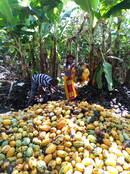News

Invitation to submit proposal for the provision of “Global and regional analysis of underlying drivers of deforestation".
Full details in the document available here
Closing date and time: 9 November 2021 – 23:59 (CET)
To learn more on FAO REDD+ work click here

The Food and Agriculture Organization of the United Nations (FAO) and the Ministry of Agriculture, Forestry and Fisheries of Japan (MAFF) are pleased to invite you to the webinar “Climate finance opportunities to foster forest-positive agriculture.” This session will be the third of three online events to be held in September and October under the common topic of “Halting deforestation: approaches and tools for forest-positive commodity value chains” (please scroll down for more information on the webinar series).
Session 3: Climate finance opportunities to foster forest-positive agriculture
Date: 20 October 2021
Time: 14:00-15:30 (Rome), 21:00 (Tokyo), 8:00 (Santiago)
Language: English, French, Spanish
Registration: https://bit.ly/ForestPos3
Objectives:
Provide an overview of opportunities to use climate finance, including REDD+ funding mechanisms,...

The Ivorian government, through the combined action of several ministries, including the Ministry of Environment and Sustainable Development (MINEDD), aims to gradually restore its forest cover to 20% by 2030. In order to meet this challenge, it applied for and obtained, with the support of the Food and Agriculture Organization of the United Nations (FAO), a fund of five billion CFA francs from the Green Climate Fund (GCF) in the framework of the implementation of the five-year project “Promoting deforestation-free cocoa production to reduce emissions in Côte d'Ivoire (PROMIRE).”
Parfait Kouadio, Chief of Staff of the Ministry of Environment and Sustainable...
Government action for forest positive landscapes: food-for-thought for the Food Systems Summit
22/09/2021
22/09/2021

We stand face to face with a ‘quadruple’ planetary emergency, consisting of the interlinked crises of climate change, global health, biodiversity and food security. To meet these pressing global challenges –all of which have consequences for food security – we must transform our global food system.
In order to sustainably meet projected food demand by 2050 while avoiding climate catastrophe, the global food system must double food production whilst decreasing agricultural emissions by two-thirds. Critically, policies that reduce land use change and promote ‘forest positive’ agriculture must be put in place to avoid the expansion of crop and pasture into forests...

The world’s current method of food production isn’t working. Not for the estimated 500 million farming households in the developing world who produce one third of the world’s food, nor for the health of the planet. The current system often perpetuates the destruction of natural systems that underpin food production, including soil, water and climate.
As we continue to push the planet to its limits, the UN Food Systems Summit looks to curb damage to the environment and tackle world hunger by supporting ambitious new actions for transforming our global food systems and delivering progress towards SDGs and the 2030 Agenda....

